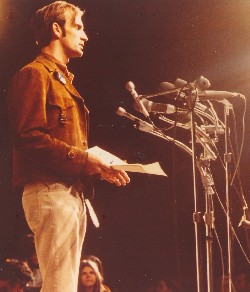Earth Day: from someone who started it all
We've read a lot of articles the last couple weeks about Earth Day - articles looking back over the last 40 years and articles questioning the place Earth Day and environmental issues hold in the current economic and political landscape.
But far and away the most fascinating article to date was one published in Yale's Environment 360, a publication of the Yale School of Forestry & Environmental Studies.
Denis Hayes, a national coordinator for the first Earth Day in 1970 and international chair of Earth Day 2010 weighed in on the lack of real depth in celebrating Earth Day (a mainstream phenomenon he calls it), commenting that, "Earth Day is a Mississippi River phenomenon – a mile wide but only a few inches deep", as well as reminiscing on a time when Earth Day was a bipartisan objective and what went wrong there. * below photo is of Hayes - courtesty of University of Albany.

Much of Hayes editorial is devoted to a subject that has been debated to death, both here on this blog and on every like blog and news source in the world, which is the only real solution to the ecological problems (and economical problems related to energy) that we face is legislation that has teeth and accountability of our elected officials that this is the only way.
Hayes says about this: "This won’t happen as a result of Congressional brilliance and courage.
Although Congress has some brilliant, courageous individual members, as
an institution it is dumb and cowardly. The only way that Congress will
act intelligently and boldly on this issue is if we give it no choice.
A large block of Americans must make the climate disruption issue an initial voting screen. If a candidate is ok on climate, then
we will look at the rest of her record. To move this issue forward, our
voices must be as loud as those hollering for the right to carry a Colt
into Starbucks or for saving Granny from death panels."
Check after the jump for other excerpts from this wonderfully written piece.
Hayes on a time of bipartisan support and what happened: Republicans once counted among their leaders such thoughtful,
progressive, green politicians as Nelson Rockefeller, Chuck Percy,
Elliott Richardson, Ed Brooke, Bill Scranton, Jacob Javitz, John
Chafee, and Mark Hatfield. Indeed, it was a Republican — Howard Baker —
who drafted the most radical provision in the Clean Air Act, the
“technology forcing” section that required all new cars to have
catalytic converters, even though no such device was yet commercially
available.
But by 1980, when Ronald Reagan carried every southern state except
Georgia (Jimmy Carter’s home state), the Republican party had been
transformed. President Reagan assembled the most anti-environmental
cabinet in history.
Although both parties once included important mixtures of left and
right, they have become increasingly polarized. In fact, the Republican
leadership is now so robustly anti-environmental that the League of
Conservation Voters uses affirmative action in evaluating its
scorecards. A Democrat with a 60 percent voting record is seen as
awful, while a Republican with 60 percent is seen as exceptional.
Hayes on Washington Senator Maria Cantwell's climate bill - the Clear Act and why some say it can't be passed: Most experts I know agree, in private, that the Cantwell-Collins bill in the Senate is the best climate legislation that has yet been proposed. In fact, it is the only option under consideration that would make a meaningful dent in greenhouse gas emissions in the near term. It places an absolute cap on carbon where it enters the economy; auctions 100 percent of carbon permits; and returns the revenues to the public on a pro rata basis. Moreover, it’s just 40 pages long, while the competing bills contain another thousand pages of loopholes, special interest exceptions, and bad baggage. But the so-called eco-pragmatists have one powerful argument against it. They say it can’t be passed. A prominent green leader told me, “To pass any climate bill at all, we have to appease coal-state Democrats, shovel as much money as necessary to pro-nuclear Republicans, and buy off the electric utilities.” That is an apt description of the Kerry-Lieberman-Graham bill now making the rounds in the Senate.
